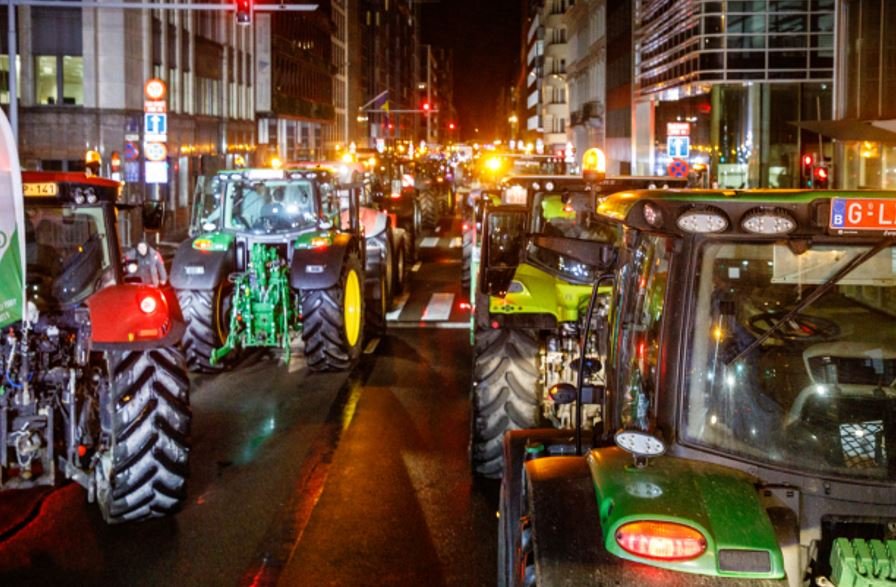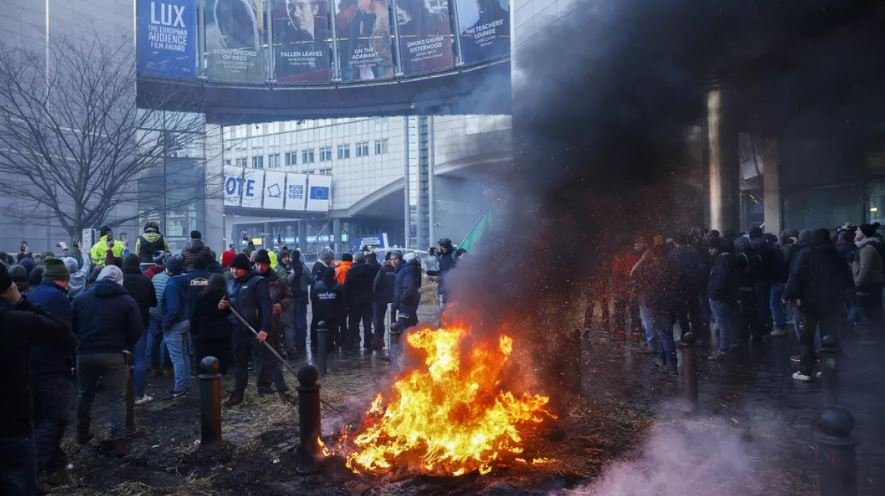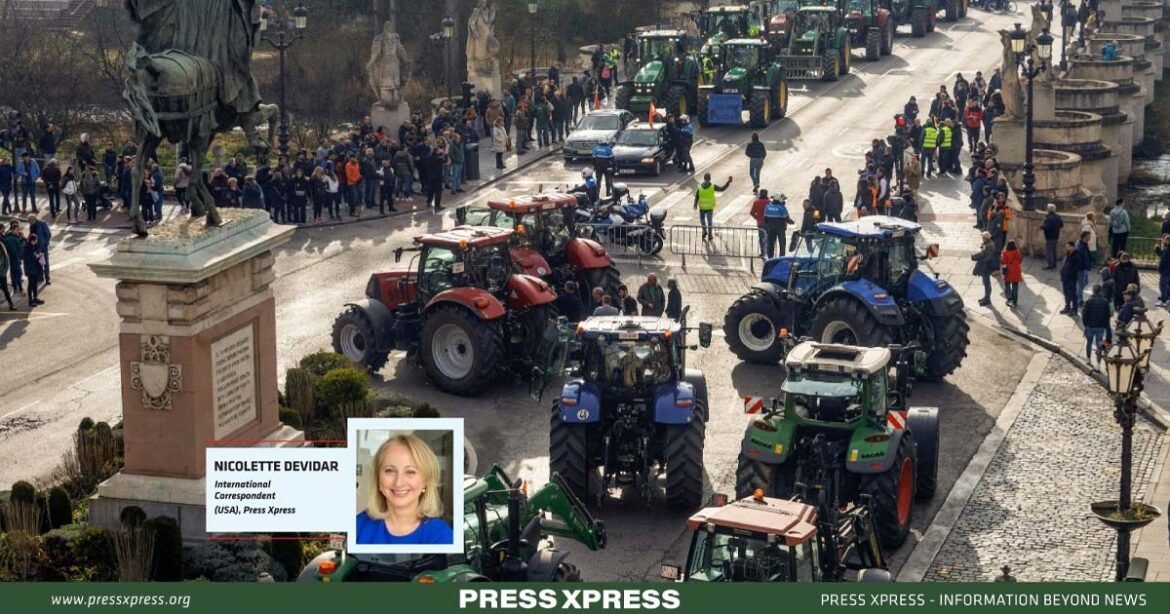Farmers in Europe have reached their breaking point, expressing their anger through ongoing protests that are engulfing all of Europe by now. It’s no longer just about diesel tax for tractors; or the end of the cut of the diesel subsidies; now, the green agenda instills fear for survival among farmers. The EU bureaucrat determined ‘green agenda’ is killing the actual green that’s needed for a continuous stable food supply in Europe as Europe’s farmers, particularly the small ones, are hit hard by Brussels’ demands and focus on ‘transformation’. They fear the end of their businesses as many already have a hard time maintaining their farms and agriculture in the current economic climate.
You Can Also Read: US Border Crisis: Texas Standoff, A Test of Time
In order to reduce greenhouse gas emissions and achieve what Brussels’ deems a “more sustainable” agriculture, the EU proposed to halve the use of pesticides by 2030. Reduce nitrogen, methane, and other emissions linked to farming by nearly one-third to cut greenhouse gas emissions by 90% by 2040.
They were doubling organic production and re-wilding farmland. In itself, not bad suggestions as healthier food and a more sustainable agriculture approach would benefit almost everyone. If they were treated as suggestions and not forced by restrictions and regulations that were made in plush offices in Brussels, with little to no input by the farmers that have to shoulder the change. Hops and wine producers would have been especially hard hit by these regulations. In addition, these proposed regulations are coming at difficult times.
As the Ukraine war has upended global food markets and farmers face a cut in subsidies in the 55 billion Euro a year ‘Common Agricultural Policy’ program — a key pillar to Europe’s food security since 1962 – they are also facing mounting pressure by supermarkets, who in turn want to contain prices from going through the roof.
One-Rule-for-All
Another key piece to Brussel’s approach of forced regulation and one-rule-for-all is that Europe’s farms are quite different in type and scale, thus, farmers cannot equally implement the EU’s demands. Europe’s agriculture sector is comprised of large industrial outputs and smaller farms that have been family hands for generations. The latter operate generally on very thin margins, to begin with. There is not much room for adapting or accommodating larger cost structures or big changes in a short period of time. Many small farms would face ruin if all those rules by Brussels would be executed.
Since 2005, the number of farms in the EU have already shrunk by more than a third. While farms on average got bigger, the income has remained stubbornly low, at about 20,000 EUR per person. Farmers find themselves squeezed between environmental demands and supermarkets. They say, what they’re being asked is too much.

Protests from Greece to Germany have been taken to the streets as regulators in Brussels are discussing rules that will lead to farms being treated as industrial plants such as steel mills or chemicals, instead of a living land with different implementation landscapes, and force farmers to change.
It’s one thing to decide from cozy offices in Brussels by people who enjoy tax benefits, regulated working hours, regular high salaries, paid vacation, and plenty of time off; and quite another for those who have to get up at dawn, get on the fields and man a farm 24/7, for 52 weeks of the year. A reality that is too far a stretch for technocrats in Brussels to even imagine and for farmers to accept. What may look good on paper, may turn into a disaster for many in real life. That’s the problem with a centralized technocrat approach –decision-making by distance so to speak – that affects those that actually deal with the ins and outs of producing and creating value everyday. As the farmers put it “People who have no clue, make decisions for all of us; enough of the Brussels diktat”.
Plea and Protest
From Germany to the Netherlands, to France, Greece, Portugal, Ireland, and now Finland, farmers are united in their plea and protest. Last Friday, German farmers blocked the border to Poland in Mecklenburg Vorpommen; the container terminals of Bremerhaven as well as Germany’s largest airport, Frankfurt am Main. The day before, on Thursday, protesting farmers descended on the European technocrat power hub Brussels, at a time when Europe’s head of states convened in another summit about Ukraine. The angry farmers threw eggs and firesparks in the direction of the European Parliament. Sending a loud message: enough of over-ambitious climate goals; enough of diesel tax; enough of technocrats meddling in affairs of those who actually produce the output.

Finally, yesterday, February 6, Ursula von der Leyen, President of the EU Commission caved in. Brussels is rowing back from some of its demands. For now, reframing the language of the proposal, putting the farmer more in the center as an integral part of a stable food supply in Europe, and also removing some of its overly ambitious goals.
The EU dropped the demand to halve pesticide use within six years. And took the recommendation of eating less meat for Europeans off the table. A small step, whether enough remains to be seen. As the protests are ongoing, supermarket shelves in Brussels and other places are left empty. With EU elections coming up in June this year, parties within the EU are nervous about farmers taking their anger to the ballots and giving their votes to parties located further on the right.
The withdrawal of the SUR (Sustainable Use Regulation) proposal by the EU Commission is seen as a positive sign, but also only as a temporary one. A return of the proposal in a changed form is expected by farmer’s associations such as the BBV, and the Bavarian Farmers Association.
The problem with decision-making in Brussels has always been a lack of understanding between those who create value in societies and those who simply siphon the value created by others off and distribute it the way they see fit. But the people who actually have to make the shift are most often left out of the process.
They are the ones who would have to shoulder the pain. And the cost. Not the bureaucrats in Brussels.
‘Transformation’ Fatigue all across Europe
Consequently, in Europe, a widespread “transformation” fatigue is setting in. Ruling governments seem surprised about a growing voters’ shift towards more populist parties who seem to capture the fears and concerns of the people affected more effectively. Doubtful that the traditional mainstream parties find political solutions fast enough to offer a more competitive and realistic policy stand — one that resonates with people enough to quell their anger – until election time in June.
Farmers coming out in large crowds are sending a clear signal. Europe is over-regulated and people are a lot less willing to tolerate the continuation of how things have been done and how far they go at this point. They are no longer willing to tolerate too much of “Brussels dictate” as farmers and people on the street across Europe phrased it.


